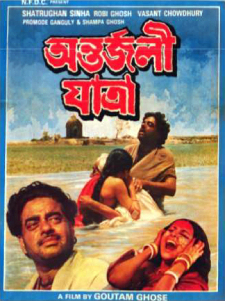Top Qs
Timeline
Chat
Perspective
Antarjali Jatra
1987 film From Wikipedia, the free encyclopedia
Remove ads
Antarjali Jatra (The Ultimate Journey, Bengali: অন্তর্জলী যাত্রা), also known as Antarjali Yatra, is a 1987 film directed by Kolkata-based Indian film director Goutam Ghose based on a novel, Mahayatra, by Kamal Kumar Majumdar.[1] It documents the institution of Kulin Brahmin polygamy in nineteenth-century Bengal.
The film won the National Film Award for Best Feature Film in Bengali in 1988. It was screened in the Un Certain Regard section of the 1988 Cannes Film Festival.[2][3]
Remove ads
Plot
The film opens with Seetaram, a rich Kulin Brahmin, being brought to the bank of the Ganga for a virtuous death in contact with the holy river's waters (called Antarjali in Bengali), as suggested by his family priest. He does not die, even after waiting for a few days. An astrologer suggests that he would not die without a companion, i.e., a wife. An old Brahmin takes this opportunity to get rid of the burden of his young daughter Yashobati, without dowry, knowing that Seetaram is on his deathbed. Baiju, a kind-hearted chandala (an untouchable Hindu caste traditionally employed as crematorium workers) tries to reason with Yashobati, a newlywed, to run away. He narrates his inability to be a part of sin by making a funeral pyre for the newlywed and burning a young widow. He tries to reason with her that glory in sati is hollow.
Remove ads
Cast
- Shatrughan Sinha as Baiju
- Basanta Choudhury as Yashobati's Father
- Promode Ganguly as Seetaram
- Rabi Ghosh as an Astrologer
- Shampa Ghosh as Yashobati
- Mohan Agashe as Vaidya (Physician)
Awards
The film got National Film Award for Best Feature Film in Bengali in 1988.
It was screened in the Un Certain Regard section of the 1988 Cannes Film Festival and Grand Prix at Tashkent Film Festival 1988.
References
External links
Wikiwand - on
Seamless Wikipedia browsing. On steroids.
Remove ads

